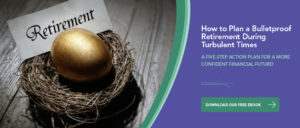How Can a High Net-Worth Individual Fortify Investments?
These can be challenging times for investors. As I’ve mentioned before, the classic 60/40 investment portfolio is not the reliable go-to it was for decades. The economy and stock market both tend to be cyclical, so they should improve over time. However, that probably won’t happen overnight.
This is why having a well-diversified investment portfolio is always a good idea. What follows are some additional tips to consider.
This article considers these topics:
- Resist the urge to sell when the market is down; focus on the long-term
- Update/review your retirement projections
- Affirm your investment objectives & rebalance as needed
- Delegate the management of your savings to a professional
Resist the Urge To Sell When the Market Is Down; Focus on the Long-Term
This might be the simplest step, but it can also be the most challenging task for some people. No one knows what the stock market is going to do on any given day. For this reason, many investors feel tempted to sell their stocks when the market takes a downturn in order to avoid losing additional money. That is sometimes called the maximum pain threshold or “get me out at any price”.
And money is an emotional subject for most of us. It gets even more emotional when the news sometimes obsesses over the worst projected scenario imaginable. The rougher economic headlines can even trigger some people’s fight-or-flight response.
Nevertheless, in order to achieve consistent long-term growth, it’s vital to resist the urge to emotionally sell. You should focus on the long-term and your strategies instead. By maintaining a diversified portfolio and resisting the temptation to panic sell, you’re less likely to miss out on potential gains.
This is why a buy-high-and-sell-low approach can actually be counterproductive in the long run. Studies have shown that investors who stay the course during times of market volatility tend to see greater returns over time. As a result, they don’t miss out on the rebound that often follows a dip in the market. The time to sell is often when investors are least inclined to do so!
There’s a potential bonus, as well: By not panicking and selling when prices are down, savvy investors can use the opportunity to add money at depressed prices. Not panicking during times of market volatility can allow you to position yourself for greater returns in the long run.
For instance, a tech company whose stock is down right now due to supply chain issues could still recoup all its losses, given time. When that happens, those who panicked and sold all their shares can wind up kicking themselves over the gains they could have seen. The key is knowing which companies are suffering because of macro challenges versus those struggling internally.
It also bears mentioning that even if you are seeing losses on some investments now, other investments may be offering some ballast. It’s vital that investors not only diversify among assets, but strategies as well.
Learn More About Heritage Capital’s Investment Approach. Schedule a Free, No-Commitment Meeting Here.
Affirm Your Investment Objectives & Rebalance, As Needed
As people approach retirement, even the affluent often begin to worry about whether their savings will last. It is wise to consider many scenarios that could occur once you retire so there are no surprises you are unprepared to deal with.
One of the biggest financial concerns during retirement is the impact of inflation. Over time, the cost of living tends to increase, which can eat into your nest egg if you’re not careful.
Thankfully, one way to help protect your portfolio through periods of inflation is to review your retirement projections on a regular basis. Estimating how much you’ll need to cover your expenses can help to make sure that your savings are on track for your goals.
Checking well ahead of your exit from the workforce means that you’re also in a favorable position to make adjustments. If you find that your projected income is falling short, you should still have time to take steps to adjust your portfolio accordingly.
For example, you may want to invest in inflation-protected securities or increase your contributions to your retirement account before you retire. Being proactive can help ensure that your lifestyle is comfortable once you retire.
Affirm Your Investment Objectives & Rebalance
It’s also more important than ever to affirm your investment objectives and rebalance your portfolio accordingly, especially during volatile market conditions. This can help fortify your assets against inflationary pressures as well as large market swings,
Many investors choose to invest in a mix of asset types. Rather than sticking solely with various stocks and bonds, they vary their asset types to include things like commodities, hedge funds, and real estate investment trusts (REITs).
The idea is to prevent a loss from any one asset from having too great of an impact on the overall performance of your portfolio. Using the old analogy, don’t keep all of your eggs in one basket. Using a variety of asset classes and strategies can mean a greater probability of favorable results from other investments.
Since real estate and commodities’ value is not derived from the stock market, they tend to hold their value more, even during volatility. This diversification can help mitigate many of the risks associated with inflation and/or volatile markets.
Of course, no investment strategy is perfect; however, by reviewing your investment objectives and rebalancing your portfolio periodically, you can help give yourself the best chance for success in any financial climate.
Delegate the Management of Your Savings to a Professional
 Some investors may be tempted to try a D-I-Y approach to the above strategies. It might be worth attempting if you have the time, knowledge, and inclination.
Some investors may be tempted to try a D-I-Y approach to the above strategies. It might be worth attempting if you have the time, knowledge, and inclination.
However, many tax code updates could impact your bottom line as well as your tax position.
When you work with a fiduciary wealth manager who has tax planning expertise, they can help you navigate any potential red flags that could trigger more scrutiny of your financial situation.
Heritage Capital, LLC is home to an experienced team of financial advisors specializing in high-net-worth retirement planning in Connecticut. In addition to our other accomplishments, I recently added Accredited Investment Fiduciary® (AIF®) to my list.
Contact us if you’re ready for a conversation about anything from expanding your business to the money-saving possibilities of a tax loss harvest.


